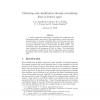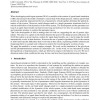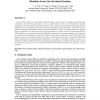1511 search results - page 85 / 303 » A Methodology for Developing Agent Based Systems |
ATAL
2004
Springer
15 years 4 months ago
2004
Springer
We define trust-based mechanism design as an augmentation of traditional mechanism design in which agents take into account the degree of trust that they have in their counterpar...
MMAS
2010
Springer
14 years 6 months ago
2010
Springer
A unified variational methodology is developed for classification and clustering problems, and tested in the classification of tumors from gene expression data. It is based on flu...
ITS
2004
Springer
15 years 4 months ago
2004
Springer
The need for rapid and cost-effective development Intelligent Tutoring Systems with flexible pedagogical approaches has led to a demand for authoring tools. The authoring systems ...
103
click to vote
MABS
2005
Springer
15 years 4 months ago
2005
Springer
When developping multi-agent systems (MAS) or models in the context of agent-based simulation (ABS), the tuning of the model constitutes a crucial step of the design process. Inde...
JSS
2008
14 years 11 months ago
2008
Service-based systems are distributed computing systems with the major advantage of enabling rapid composition of distributed applications, such as collaborative research and deve...



